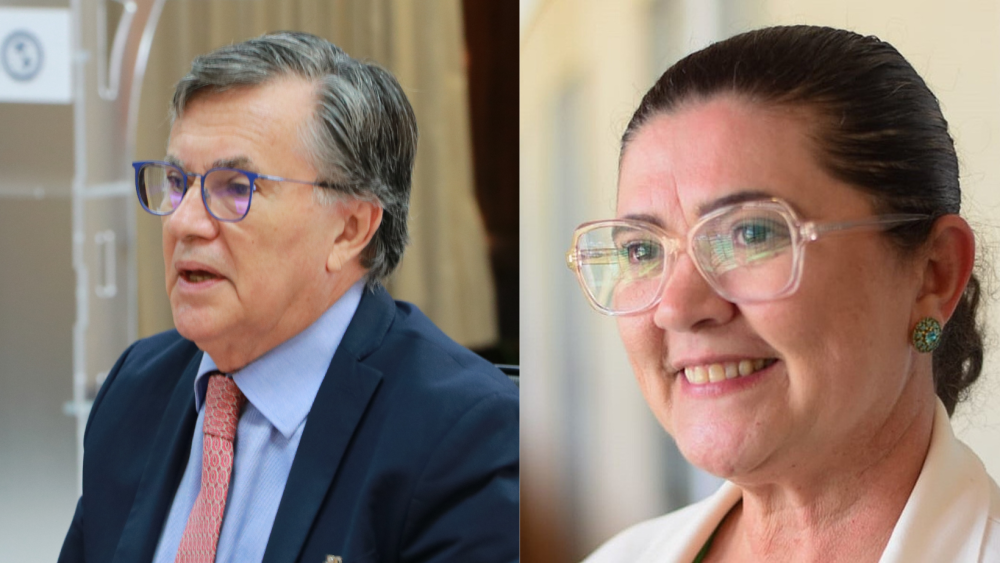The participants in Dialogues organized by the Brazilian government and IICA conclude that cooperatives, science and technology, connectivity and financing should be core elements of policies designed to strengthen family farming

San José, September 13, 2023 (IICA). Strengthening family farming in the hemisphere is a way to promote prosperity, gender equality, innovation and the sustainability of agrifood systems, according to senior officials and representatives of governments, international agencies and peasant and indigenous organizations, as well as experts from a number of countries, meeting in Brasilia.
The Dialogues on Family Farming in the Americas organized by Brazil’s Ministry of Agricultural Development and Family Farming (MDA) and the Inter-American Institute for Cooperation on Agriculture (IICA) consisted of two days of discussions and the sharing of experiences at the Itamaraty Palace, the headquarters of Brazil’s Ministry of Foreign Affairs.
Following numerous contributions and collective construction, the activity concluded with the reading of what, in the participants’ opinion, should be core elements of a new generation of public policies on family farming.
Those elements include the need to: foster associative enterprises and cooperatives; facilitate small farmers’ adoption of science and technology; promote the rollout of connectivity across all the rural areas of the continent; and boost access to credit.
The conclusions will be presented to the Inter-American Board of Agriculture (IABA), IICA’s highest governing body, which is made up of the ministers of agriculture of the Americas and will be meeting from October 3-5. IICA will also be taking the document to the next United Nations Climate Change Conference (COP 28), which is set to begin on November 30 in Dubai.
Paulo Teixeira, Brazil’s Minister of Agricultural Development and Family Farming, took part in the opening ceremony of the Dialogues, while the closing was session was chaired jointly by the National Secretary of Family Agriculture and Agroecology, Patricia Vasconcelos, and the Director General of IICA, Manuel Otero, accompanied by the Institute’s Representative in Brazil, Gabriel Delgado.
Vasconcelos stressed the importance for the Brazilian government of its partnership with IICA, to advance towards its goal of strengthening family farming, which is key to the social and economic development of the country and the region as a whole.
“It is essential that governments recognize family farming’s capacity to contribute not only to food security and the economy, but also to prosperity in rural areas, gender equality, innovation, climate change mitigation and sustainability,” Vasconcelos commented.
The official accepted that countries in the region still had a long way to go in providing family farmers with the conditions they need to obtain better access to markets, services and suitable technologies that enable them to achieve better living conditions and make a greater contribution to social and economic development.
New generation of public policies
Manuel Otero said that family farming was often unfairly associated with the destruction of soils or singled out for criticism because it did not create employment or incorporate technology, but that was a distortion of the truth.
The IICA Director General believed that the countries and international agencies had a responsibility to promote a new generation of public policies to speed up the prioritization of family farming.
“We need to create virtuous circles so that women, young people and vulnerable groups play a leading role in the transformation of agriculture. The cooperative movement is vital and should be offered incentives. We should also incorporate the new frontier of knowledge, along with the ancestral knowledge of our rural populations. Lastly, greater connectivity and access to financing are bridges that can make our family farmers key players in the transformation process,” Otero remarked.
One of the most important points on which the participants were agreed was the need to broaden and deepen the development of the legal and institutional frameworks for family farming, recognizing the rights of small-scale producers as subjects of public policy, which would afford them formal access to productive resources.
It was also pointed out that, despite the growing role they play in family farming, and in society in general, women still have to contend with unequal access to resources and the decision-making process. That is why it is imperative to promote economic equity and rural women’s right to have their own independent income, as well as their rights agenda.
Guaranteeing access to productive resources and to land and capital in particular is another critical aspect. Therefore, mechanisms need to be developed that facilitate the acquisition of land, including alternative ways of using it for young people, as well as access to productive capital.
Another point of agreement was that the transformation of production should facilitate the transition from traditional systems to agroecological, or sustainable, production systems. Systems of this kind enhance the capabilities of family farming for the efforts to combat climate change, and for climate change adaptation. Public policies should facilitate this transition by stimulating more investment in research and technology, training, technical assistance, and the sharing of experiences.
More information:
Institutional Communication Division.
comunicacion.institucional@iica.int